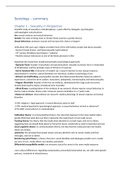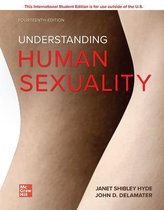Sexology – summary
Chapter 1 – Sexuality in Perspective
Scientific study of sexuality is interdisciplinary: a joint effort by biologists, psychologists,
anthropologists and physicians
Sex: sexual anatomy and sexual behaviour
Gender: the state of being male or female (book assumes a gender binary)
Sexual behaviour: produces arousal and increases the chance of orgasm
Until about 100 years ago: religion provided most of the information people had about sexuality
- Ancient Greeks (homo- and heterosexuality (split bodies))
- 15th century Christians (wet dreams = sodomy)
- Muslims (sexual intercourse as one of the finest pleasures in life)
Important Sex researchers (medical/psychiatric/psychological approach)
- Sigmund Freud: founder of psychiatry and psychoanalysis: sexuality is primary force in motivation
of all behaviour and the principle cause of all forms of neurosis
- Henry Havelock Ellis: forerunner of modern sex research (women & men sexual creatures,
masturbation is common, sexual deviations are harmless), studies in psychology of sex
- Richard von Krafft-Ebing: psychopathia sexualis: described sexual disorders based on patient’s
experiences, coined the terms sadism, masochism, pedophelia, homosexuality and heterosexuality
- Magnus Hirschfeld: founder of the first sex institute, administered first large scale sex survey
(mostly destroyed by Nazis), introduced term travestite
- Alfred Kinsey: founding father of the institute of sex research, Kinsey reports: sexual behaviour in
human male & female, Kinsey scale: measures sexual orientation on a 7 point scale
-Masters & Johnson: observational sex research: studies physiology of sexual response and sexual
disorders
<1900: religious + legal approach: is sexual behaviour good or bad?
~1900: medical/psychiatric/psychological approach: is sexual behaviour normal or abnormal?
1973-2000: constructivism vs medicalization
Cultivation theory: in communications theory, the view that exposure to the mass media makes
people think that what they see there represents the mainstream of wat really occurs.
Framing theory: the theory that the media draw attention to certain topics and not to others,
suggesting how we should think about or frame the issues: media tells us what is important and not
Social cognitive theory: in communications theory, the idea that the media provide role models
whom we imitate.
selectivity: the principle that people selsect and pay attention only to certain media and their
messages, and not to others
Reinforcing spiral theory: a theory that one’s social identities and ideologies predicts one’s media
use and, in turn, media affects our identity and beliefs
Differential susceptibility model: not everyone reacts the same to the same media exposure
cross cultural differences: regarding masturbation, premarital/extramarital sex, sex with same gender
partners, standards of attractiveness.
,Sexual health: a state of physical, emotional, mental and social wellbeing in relation to sexuality
Sexual rights: basic, inalienable rights regarding sexuality, both positive (to) and negative (from)
Chapter 2 – Theoretical Perspectives on Sexuality
4 main theoretical perspectives on sexuality: evolutionary theories, psychological theories, critical
theories and sociological perspectives
Evolutionary theories
Sociobiology
Socio-biology: application of evolutionary biology to understand the social behaviour of animals,
including humans
try to understand the patterns of behaviour
evolution: all living things have acquired their present forms through gradual changes in their genetic
endowment over successive generations
Natural selection: a process in nature resulting in greater rates of survival in plants and animals that
are best adapted to their environment
In terms of evolution, what counts is producing lots of healthy, viable offspring who carry on one’s
genes:
- identifying healthy mates (physical attractiveness)
- courtship patterns (assessing fitness, expenditure of money, dancing)
- family structure and infant vulnerability (pair bond: mother and father, attachment: infant parents)
Parental investment: behaviours or other investments in the offspring by the parents increase the
offspring’s chance of survival
Sexual selection: a specific type of selection that creates differences between males and females
2 processes:
- competition among members of 1 gender (usually males) for mating access to members of the
other gender
- preferential choice by members of one gender (usually females) for certain members of the other
gender
CRITICS SOCIOBIOLOGY
- implies biological determinism
- rests on an outmoded version of evolutionary theory that modern biologists consider naïve
- assume that the central function of sex is reproduction (not true today)
Evolutionary psychology
Evolutionary psychology: focuses on psychological mechanisms that have been shaped by evolution
assumes that every characteristic we observe must have some adaptive significance
- one line of research centres on sexual strategies: women and men face different adaptive problems
in short term, or causal mating and in long-term mating and reproduction
CRITICS:
- inconsistency in study outcomes on sexual strategies
- assumes that every characteristic has evolutionary advantage (no, random mutations)
- WEIRD
Gender-neutral evolutionary theory: (Gowaty): the environments in which humans find themselves
vary enormously. it is adaptive for humans to display flexible behaviours that is what evolution
, has selected for: flexibility and adaptability
Psychological theories
Psychoanalytic theory
Psychoanalytic theory (Freud): contains a basic assumption that part of human personality is
unconscious
- human behaviour is driven by libido (sex drive/sex energy) and Thanatos (death)
- focused in various regions of the body known as erogenous zones (areas of the body that are
particularly sensitive to sexual stimulation)
- human personality structure consists of 3 components: Id (pleasure principle; present at birth,
contains libido), Ego (reality principle; exists to keep a check on id) and Superego: (idealism:
considered to be our conscious)
Phases of psychosexual development
- Oral phase (up to 1 year): pleasure is derived from stimulating the lips and mouth
- Anal phase (year 2): pleasure is derived from controlling bladder and bowel movement
- Phallic phase (3-6 y): child’s interest in its genitals: Oedipus complex (sexual attraction of a boy to
his mother, fearing fathers retaliation feels castration anxiety and eventually stops desiring his
mother and shifts to identifying with his father) and Electra complex (sexual attraction of a girl to her
father, penis envy, resolution not so complete female<male)
- Latency (6-adolescence): Sexual impulses are repressed or are in a quiescent state
- Genital phase: sexual urges reawaken in puberty, and become more specifically genital. Oral, anal
and genital urges fuse together to promote reproduction
People do not always mature from one stage to the next, most adults have at least traces of earlier
stages remaining in their personalities. Fixation may lead to unusual sexual interests and behaviours
in adulthood
EVALUATION
- most of its concepts cannot be evaluated scientifically
- Data were derived from (disturbed) patients of Freud
- Overemphasis on the biological determinants of behaviour (instincts)
- a male-centred theory that may cause harm to women
+ he succeeded in introducing sex as an appropriate topic for scientific research
Learning theory
Although much of human sexual behaviour is biologically controlled, it is apparent that much of it is
learned. Grew out of the behaviourism movement (observable behaviour primary unit of analysis)
Sexual behaviours largely represent learned associations
Classical conditioning (Pavlov): a previously neutral stimulus (CS/bell) is repeatedly paired with an
unconditioned stimulus (US/food) that elicits an unconditioned response (UR/salivation). After a
while the CS elicits a CR (salivating when seeing bell)
Operant conditioning (Skinner): reinforced behaviours increase in frequency, punished behaviours
decrease. The consequences of reinforcement or punishment are most effective in shaping behaviour
when they occur immediately after the behaviour
if sexual intercourse has repeatedly been associated with punishment the behaviour becomes less
frequent.






